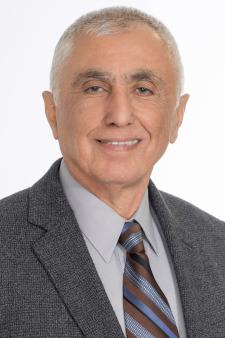WMU geoscientist honored with prestigious scholar award for research in remote sensing, water resources
KALAMAZOO, Mich.—From tracking groundwater beneath deserts to predicting harmful algal blooms in the Great Lakes, Western Michigan University’s Dr. Mohamed Sultan has built a distinguished career using satellite data to address critical environmental challenges. In recognition of his outstanding contributions to research, teaching and mentorship, Sultan has been named the recipient of WMU’s Distinguished Faculty Scholar Award, the University’s highest honor for faculty achievement.
“Dr. Sultan has committed two decades of research and scholarship in his field, and we are extremely proud to award him as this year’s Distinguished Faculty Scholar,” says Dr. Chris Cheatham, interim provost and vice president for academic affairs. “Just as impressive is his dedication to advancing Experience-Driven Learning while mentoring students in the geological and environmental sciences, empowering them to pursue their own paths of discovery.”
Sultan will be honored at the Fall Awards Celebration on Friday, Oct. 3, alongside recipients of other prestigious campuswide awards, including the Distinguished Service, Distinguished Teaching, Emerging Scholar, Excellence in Diversity Global Engagement and annual Make a Difference awards. The event begins at 11 a.m. in Kirsch Auditorium of the Fetzer Center.
A professor in the Department of Geological and Environmental Sciences since 2004, Sultan is internationally recognized for his innovative use of remote sensing technologies to study water resources, climate change, natural hazards and mineral exploration. After serving as department chair for 16 years, he stepped down in 2020 to focus on research and student mentorship. He continues to lead the Earth Sciences Remote Sensing (ESRS) Laboratory, where he and his team integrate satellite imagery with field-based data to investigate a wide range of environmental issues.
Sultan’s research has had both global and regional impact. His work in the Middle East has supported the development of a government-adopted system to monitor sinkhole formation in Qatar and contributed to NASA-funded studies on groundwater recharge in Egypt’s Lake Nasser region. In the Great Lakes, his projects have focused on predicting harmful algal blooms, modeling hydrologic changes in Michigan and exploring mineral recovery from legacy mine waste in the Upper Peninsula. His research has been supported by more than $8.16 million in external funding from top agencies such as NASA and the U.S. Geological Survey as well as international partners.
With over 120 peer-reviewed publications and more than 7,100 citations, Sultan has mentored nearly 50 doctoral and postdoctoral scholars. He is a Fellow of the Geological Society of America (GSA) and has received several prestigious awards, including the GSA Farouk El-Baz Award for Desert Research and the Kuwait Prize in Applied Sciences–Hydrology. He also serves on NASA’s GRACE and EMIT science teams, contributing to missions that monitor Earth’s water and mineral resources from space.
As noted by Dean Carla Koretsky in her nomination letter, “Dr. Sultan’s innovative work has provided critical tools to better understand and manage water supplies across the world. He has served as a leader and a role model for students, faculty and colleagues at Western Michigan University and across the globe.”
For more WMU news, arts and events, visit WMU News


